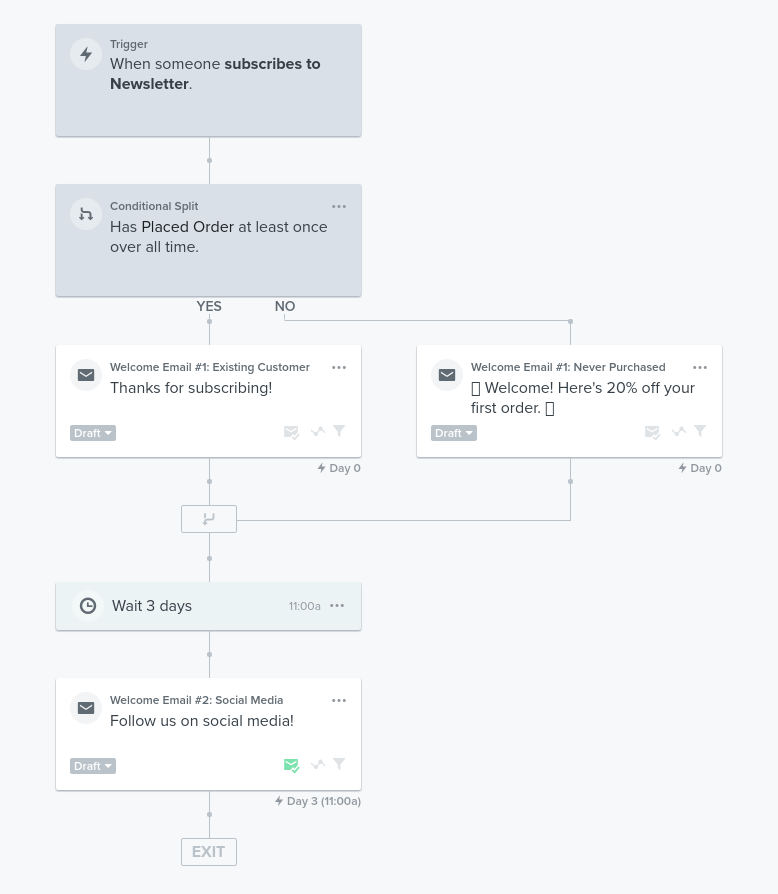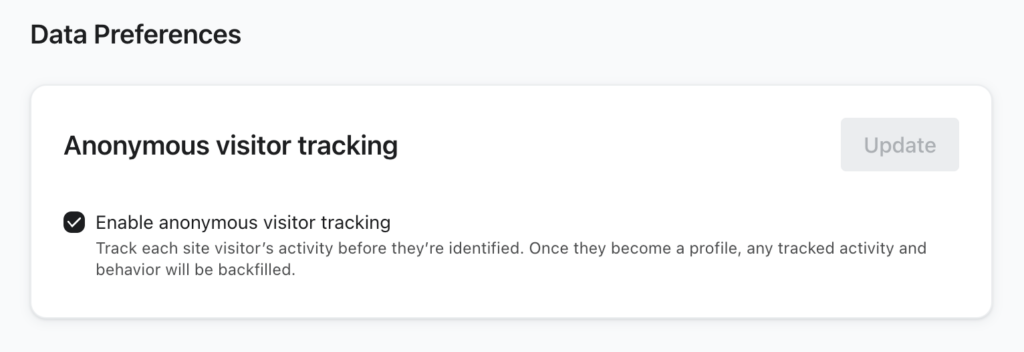An ecommerce email welcome flow sets the tone for the customer relationship by greeting new subscribers, introducing your brand, and driving first purchases. Automated welcome sequences build trust and boost conversion from day one.
What is a welcome flow?
Welcome emails are the most read emails you’ll ever send. These emails are triggered when a contact joins your email list for the first time and are your chance to set the tone for the type of experience a customer can expect from your ecommerce store. Not only that, when new contacts join your email list, this is a crucial opportunity to convert expressed interest from the email sign up into a first-time customer.
Who should receive my welcome emails?
Your welcome flow should be just that, a welcome to new email contacts. Existing email contacts do not need to be enrolled in your welcome flow since they are already familiar with your brand and are likely receiving your brand communication already.
If you use an audience identification platform like Retention.com, then you may also opt to enroll identified contacts based on an enrollment trigger like time on page or number of pages visited. Though you can enroll these contacts into a welcome flow, you’ll want to keep that flow separate from your organic welcome flow to judge effectiveness and deliverability. Also, since these contacts have not signed up for your email list, you’ll want to tailor content in this welcome flow appropriately.
How many emails should I send in my welcome flow?
There’s no perfect number of emails you should send in your welcome flow, but you probably aren’t sending enough. This is their first experience with a brand and represents new customer opportunities. You want to do whatever you can within this first flow to turn that opportunity into a new customer. Klaviyo’s welcome flow template includes three emails, but depending on your offer, you may want to send more. Here’s an overview of what the initial three could look like:

- New Customers Welcome message + discount code
- Returning Customers Welcome message
- Social Media CTA
If you have a high average order value (AOV) brand, you may need to expand this welcome flow beyond the initial three emails to align with the length of consideration required for the initial purchase. To extend your welcome flow, you may want to include content such as educational content, social proof, etc to overcome any buyer objections to the initial purchase.
What should I include in my welcome emails?
The content that you include in your welcome emails will vary based on your brand. Some brands operate discount-driven email lists. Some brands avoid offers altogether and instead, appeal to status or exclusivity. Whatever you use as a hook for your email sign up should take the lead in the first email.
Discount information
If you’ve driven an email sign up using a discount offer, you want to deliver the discount code as soon as possible. And you’ll want to resend the discount offer multiple times before the code expires. Signing up for a discount code is someone raising their hand and saying, “I’m intending to buy something.” Don’t lose this opportunity because you were afraid to email them too frequently.
Product information
As a first touchpoint with your brand, the welcome flow should include information about your product. Use this as an opportunity to give an overview of your brand. From product categories to product collections, the email flow is an opportunity to expand product knowledge for your new contact.
If a contact doesn’t convert from the first email, be sure to appeal to related products or collections that may help them find what they’re shopping for. Just because they didn’t initially convert, doesn’t mean that they won’t convert with your brand when they learn more about what you have to offer.
Educational information
For high-priced items or technically-complex items, you will likely want to include educational content in your welcome flow. Leverage your support tickets to identify the top FAQs and address them in your welcome flow. Teach your prospect about your product and highlight your product UVPs. In this case, if you have more than one SKU, you may need to segment your welcome flow by category interest. You can do this by asking your contact to self identify what they’re shopping for or use behavioral data like product page views to send them the most relevant information for their shopping.
I think maybe a lot of people imagine an agency is going to dictate how the engagement is going to go, what they’re going to do, and what they’re going to deliver. The thing I like about LimeLight is it’s collaborative. There’s a discussion about what opportunities we can take advantage of and what maybe isn’t the best fit right now. And to me that’s a big value.
Randy Estabrook, Executive Director, AWI-QCP
How can I improve my welcome emails?
If you started on Klaviyo, there’s a good chance you used the Klaviyo prebuilt Welcome Flow template, applied your branding, updated the copy to match your brand tone and called it good. But that template is merely scratching the surface for the type of experience that you can deliver to your new email contacts. Taking the following steps will level up your welcome flow, improve your customer experience, and help drive incremental conversions for your store.
Keep Reading: Guide to Ecommerce Email Marketing
Set up a dedicated welcome series for email and SMS
Did you know that a contact can only enroll in your welcome flow one time if you are using a list-based trigger? That means that if someone signs up for email and SMS at different times, they aren’t going to get a welcome experience for one of those touchpoints. Be sure to set up welcome flows for each of these communication channels so that you give the best experience to your contacts, despite what their communication preferences are. Be mindful that SMS and email are completely different channels and require different approaches in volume, messaging, etc.
Send more emails
The initial three emails from Klaviyo are not enough, but it’s a good start. If you’re looking to level up your welcome series, add additional emails to the flow and think through the experience of how someone will receive these emails. Add conditional sends for contacts who have not used their discount code. Use reviews to talk about your product categories from your customer’s eyes. Teach customers about your product and your unique value proposition.
Don’t be as concerned with new contacts opting out. If these contacts don’t convert within the welcome flow, there’s a good chance that they will never convert from your ongoing email campaigns.
Segmentation for new vs returning customers
Are welcome flows only for new customers? No, they’re for new opt-in contacts. The large majority of your email sign ups will be from new customers before they make their initial purchase, but you may also have existing customers opt-in to hearing more from your brand. Don’t ignore your existing customers. Instead, add segmentation to your welcome flow and develop messaging specifically for them. Segmenting the first email to exclude the sign up offer isn’t enough. Use this opportunity to expand category knowledge, talk about trending/most-popular products, or grow your ambassador or affiliate program.
Segmentation for product interest
If a contact joins your list as a new customer, they’re shopping for something that you have. It’s why they signed up to hear from you! Use data collected from your new contact to tailor the experience to what they’re looking for by speaking specifically to their product category interest. Don’t waste this time trying to cross sell to other product categories. Get as specific as possible and start educating about why they should choose your product over a competitor.
Protip: ensure you have anonymous visitor tracking enabled in your Klaviyo account so that you can use browsing history from before a person became a profile to tailor their welcome experience.

A/B test your welcome flow
Use a conditional split in your welcome flow to A/B test variable until you find a winning combination that drives the best performance. Variables to consider testing in your welcome flow include the timing of your emails, the audience, and the volume of emails. Though you may be happy with your current welcome flow, you should continue to look for opportunities to improve your new customer experience.
Wrap up
Your welcome flow is one of the most important of the 7 Core Email flows. It drives new customer conversions and acts as one of the first communication touchpoints with new customers. Leverage this opportunity to deliver an exceptional experience and you’ll see new customers rave about your brand while top line revenue grows.
At LimeLight Marketing, we help ecommerce brands maximize the impact of their email marketing strategy. If you aren’t generating 20% of your revenue from email marketing, it’s time to revisit your email marketing strategy.

People also asked:
What is a welcome email flow?
A welcome flow is an automated email sequence sent to new subscribers or customers that introduces your brand, builds trust, and drives first purchases.
Why is a welcome flow important for ecommerce brands?
It helps turn new subscribers into buyers by setting expectations, delivering value, and offering personalized incentives right from the start.
How many emails should a welcome flow include?
Most ecommerce welcome flows contain 3–5 emails covering brand story, social proof, product benefits, and an exclusive offer.
What’s the best timing between welcome emails?
Space them 1–2 days apart to maintain momentum without overwhelming your audience.
How does Limelight Marketing create effective welcome flows?
Limelight develops strategy, design, and copy for automated email sequences optimized for engagement, conversion, and retention.
